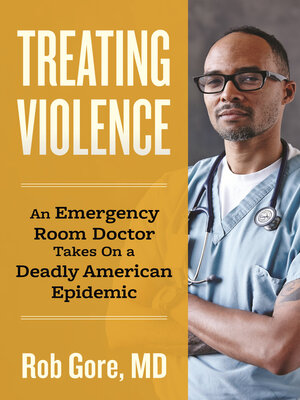
Sign up to save your library
With an OverDrive account, you can save your favorite libraries for at-a-glance information about availability. Find out more about OverDrive accounts.
Find this title in Libby, the library reading app by OverDrive.



Search for a digital library with this title
Title found at these libraries:
| Library Name | Distance |
|---|---|
| Loading... |
The inspiring story of a Black doctor who was deeply affected by the violence that plagued his Brooklyn childhood and later dedicated himself to addressing trauma and violence as public health issues
Rob Gore first encountered violence when he was beaten and robbed as a 10-year old; it was treated as an inevitable fact of life, but after another brush with violence as a teen, he began to reject that prevalent attitude. As he matured and became a doctor, he grew in his determination to find treatments for what he saw not as an unavoidable fact for most people living in vulnerable, underserved neighborhoods especially, but as a public health issue that could be addressed by early intervention and solid support, beginning in the medical community. He also became deeply involved in efforts to diversify the entire field of medicine, starting with the “front lines” in the Emergency Department.
Seeing his brother, Angel, and close friend, Willis, fall prey to the epidemic of violence with profound—and in Willis’s case—deadly consequences, Rob began seriously researching the issue and went on to found an organization which is one of the models for successful approaches to reducing violence and protecting victims, who are disproportionately BIPOC, living in impoverished neighborhoods, or members of the LGBTQ+ community. Here he provides not only statistics, but stories of what he witnessed in NYC neighborhoods, in Atlanta, Chicago, Buffalo, and even in medical work in Haiti and Kenya. His work with the Kings Against Violence Initiate (KAVI) and allied organizations is a blueprint for treating violence not as a police matter, but as a public health crisis, which can and should be addressed and substantially reduced. The people he introduces us to in these pages are not merely victims, but often advocates, paving the way for eliminating the epidemic of violence in our country.
Rob Gore first encountered violence when he was beaten and robbed as a 10-year old; it was treated as an inevitable fact of life, but after another brush with violence as a teen, he began to reject that prevalent attitude. As he matured and became a doctor, he grew in his determination to find treatments for what he saw not as an unavoidable fact for most people living in vulnerable, underserved neighborhoods especially, but as a public health issue that could be addressed by early intervention and solid support, beginning in the medical community. He also became deeply involved in efforts to diversify the entire field of medicine, starting with the “front lines” in the Emergency Department.
Seeing his brother, Angel, and close friend, Willis, fall prey to the epidemic of violence with profound—and in Willis’s case—deadly consequences, Rob began seriously researching the issue and went on to found an organization which is one of the models for successful approaches to reducing violence and protecting victims, who are disproportionately BIPOC, living in impoverished neighborhoods, or members of the LGBTQ+ community. Here he provides not only statistics, but stories of what he witnessed in NYC neighborhoods, in Atlanta, Chicago, Buffalo, and even in medical work in Haiti and Kenya. His work with the Kings Against Violence Initiate (KAVI) and allied organizations is a blueprint for treating violence not as a police matter, but as a public health crisis, which can and should be addressed and substantially reduced. The people he introduces us to in these pages are not merely victims, but often advocates, paving the way for eliminating the epidemic of violence in our country.







